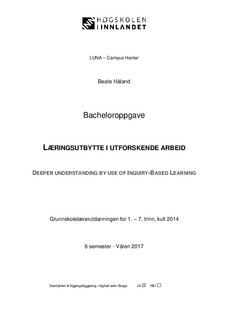Læringsutbytte i utforskende arbeid
Bachelor thesis
Permanent lenke
http://hdl.handle.net/11250/2505099Utgivelsesdato
2017Metadata
Vis full innførselSammendrag
Norsk:
I denne oppgaven ser jeg på læringsutbyttet i utforskende arbeid. Ludvigsenutvalget mener at utforskende arbeid er positivt for elevenes læring, og sier derfor at utforsking bør inkluderes som et av kompetanseområdene i fremtidens skole. Dermed er det relevant å stille spørsmål om hvordan utforskende arbeid kan gi økt læringsutbytte. Siden Kunnskapsløftet allerede har inkludert utforskende arbeid i læreplanen i naturfag, valgte jeg å gjøre undersøkelser knyttet til utforskende arbeid i naturfag. For å svare på problemstillingen benyttet jeg kvalitative intervjuer. Jeg intervjuet fire elever før og etter et utforskende undervisningsopplegg som jeg hadde med klassen. Undervisnings-opplegget ble utformet etter de fire fasene i Forskerføttermodellen, og i oppgaven blir det utforskende arbeidet diskutert med utgangspunkt i Forskerføttermodellen. For å kunne si noe om hvordan læringsutbyttet blir økt, har jeg diskutert temaene læring, motivasjon og begrepsforståelse i lys av relevant teori og funn fra intervjuene. English:
In this thesis I will take a closer look at the learning outcome in inquiry-based learning. The Ludvigsen Committee has said that inquiry-based learning is positive for the pupils learning, and that exploration should be included as a competence in the future school. That’s why I asked how inquiry-based learning can give an deeper understanding. I chose to do my study in science, because Kunnskapsløftet already has included inquiry-based learning in the curriculum in science. I used qualitative interview to give an answer to the approach. I interviewed four pupils before and after a teaching with inquiry-based learning that I had with the class. The teaching was formed by the four phases in Forskerføttermodellen, and the discussion about the inquiry-based learning is based on the model. I have discussed the themes; learning, motivation and conception understanding, in light of relevant theory and discovery from the interviews.
Beskrivelse
Bacheloroppgave, grunnskolelærerutdanning, 2017.
